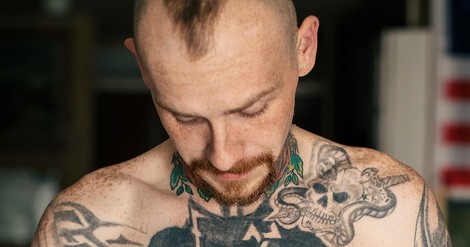Your podcast discovery platform
Curious minds select the most fascinating podcasts from around the world. Discover hand-piqd audio recommendations on your favorite topics.

piqer for: Global finds Deep Dives
Catalina Lobo-Guerrero is a freelance journalist and anthropologist currently living in Barcelona, Spain. For the past decade she has been working as an investigative journalist and correspondent in Bogotá, Colombia and Caracas, Venezuela where has written about politics, corruption, the armed conflict and violence. Her work has been published by The New York Times, The Guardian, El País and other smaller and independent media outlets in Latin America.
Inside The Radical, Uncomfortable Movement To Reform White Supremacists
"Doubt was Satan talking." That's what he'd always heard from his father, a prominent member of the Ku Klux Klan in Indiana. But that uncomfortable feeling, those questions and hesitations ruminating inside his mind would save Shane Johnson – covered with supremacist tattoos, with a criminal record and nowhere else to go – from a life of hate.
Getting out of radical groups is not only dangerous, it's almost like recovering from a nasty drug habit. In fact, those who do get out can easily turn to drugs and alcohol to fill the void they feel inside and they don't have the support groups, detox treatment clinics and ample options of support and care available to those struggling with other addictions.
Johnson hit rock bottom after being brutally attacked by his former klan members and suffering depression, but resurfaced with a mission: he would share his story and raise awareness so others wouldn't have to go through what he did.
That's what he started doing independently before he found Life after Hate, an organisation that models the work of Tore Bjorgo, a Norwegian sociologist who designed the first successful intervention model for extremists in 1997, named EXIT. Since then, the model has spread to Germany, Sweden and Switzerland.
In America, Life after Hate is the first deradicalisation activist group, and it was started by other "formers" such as Johnson. The Obama administration had given them a $400,000 grant to strengthen and expand their work. Last month, Trump's government decided to revoke the grant.There is much need for improvement in Life after Hate: its members have all sorts of issues, there are internal fights, they lack experience, etc., but despite the rhetoric and emboldenment of racist groups since Trump came to power, in the past year, Life after Hate's hotline has been getting ten messages per week from people calling for help, when the average number was usually five per month.
There's much more to this long but fascinating story in Mother Jones' latest issue. Read it.
